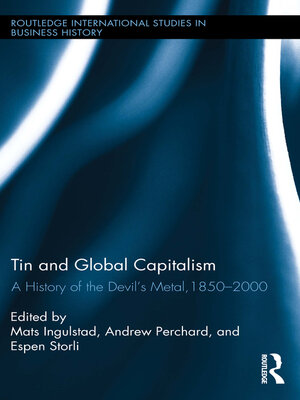Tin and Global Capitalism, 1850-2000
ebook ∣ A History of "the Devil's Metal" · Routledge International Studies in Business History
By Mats Ingulstad

Sign up to save your library
With an OverDrive account, you can save your favorite libraries for at-a-glance information about availability. Find out more about OverDrive accounts.
Find this title in Libby, the library reading app by OverDrive.



Search for a digital library with this title
Title found at these libraries:
| Library Name | Distance |
|---|---|
| Loading... |
For most of the twentieth century tin was fundamental for both warfare and welfare. The importance of tin is most powerfully represented by the tin can - an invention which created a revolution in food preservation and helped feed both the armies of the great powers and the masses of the new urban society. The trouble with tin was that economically viable deposits of the metal could only be found in a few regions of the world, predominantly in the southern hemisphere, while the main centers of consumption were in the industrialized north. The tin trade was therefore a highly politically charged economy in which states and private enterprise competed and cooperated to assert control over deposits, smelters and markets.
Tin provides a particularly telling illustration of how the interactions of business and governments shape the evolution of the global economic trade; the tin industry has experienced extensive state intervention during times of war, encompasses intense competition and cartelization, and has seen industry centers both thrive and fail in the wake of decolonization. The history of the international tin industry reveals the complex interactions and interdependencies between local actors and international networks, decolonization and globalization, as well as government foreign policies and entrepreneurial tactics. By highlighting the global struggles for control and the constantly shifting economic, geographical and political constellations within one specific industry, this collection of essays brings the state back into business history, and the firm into the history of international relations.







